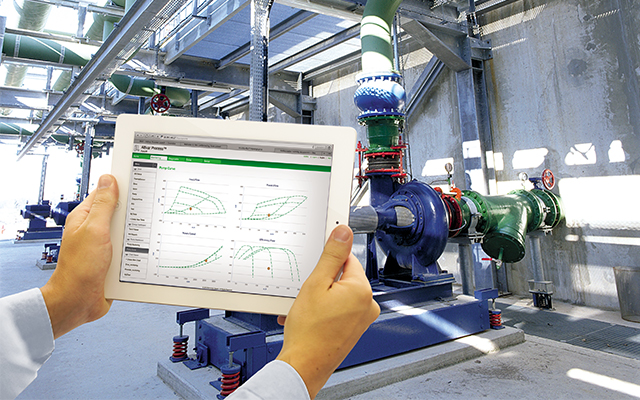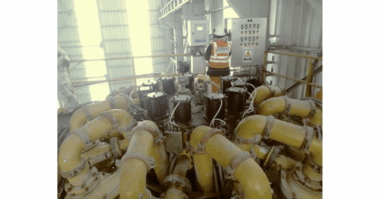Author: Jack Creamer, Market Segment Manager, Pumping Equipment – Industry Business, Schneider Electric
In a world full of connected smart machines, where we can adjust our thermostats from our smart phones and ask Alexa or Echo to play our favorite songs while creating a digital shopping list, why are we so slow to apply similar industrial technologies to the pump world?
To put it simply, the Industrial Internet of Things (IIoT) is a network of devices that can talk to each other. So if we apply the concept of IIoT to pumps, we’re really talking about pumps that can ‘talk’ to us. Why would we want that? Let’s consider some of the benefits that could be realized if the pump industry, as a whole, embraced and implemented intelligent pumping systems.
1. Energy Usage / Energy Cost
a. Incentive for Manufacturers to develop Smart Pump Systems – Electricity costs account for up to 40% of the total cost of ownership (TCO) of a pump. By following energy management best practices, a manufacturer can decrease the electrical consumption of its pumping system by at least 30%, yielding a 20% reduction in TCO and a return on investment within 24 months or less for the pump operators.
b. Incentive for End Users to install Smart Pumps – It’s a well-known fact that pumps driven by variable speed drives (VFDs) can save up to 30% energy compared to fixed speed pumps. If a smart pump operating with a VFD is monitored by end users who are benchmarking the operating performance, then owners/operators will have a baseline for optimal performance and ‘normal’ energy usage (specific to that owner’s application). For example, if an end user is monitoring current draw, and they see an increase in that draw, they can receive a warning from the intelligent pumping system alerting them to that change. Having the smart pump communicate with the operator will enable them to take action, perform inspection and/or maintenance, and remain conscious of the pumping systems’ energy usage.
2. Prevent Failure / Reduce Downtime. As previously stated, smart pumps will enable end users to better monitor their pumping systems; which in turn, will allow them to perform preventive/predictive maintenance and avoid downtime. Most owners know how expensive unplanned downtime can be, so as pump system monitoring becomes more commonplace, smart pump owners will see their maintenance dollars go much farther.
3. Water Efficiency. According to the UN, the world’s population is going to increase to an estimated 6.3 billion people over the next 30 years, creating an even greater demand for clean drinking water and better management of wastewater worldwide. Intelligent pumping systems will help us make sure we are using water efficiently, with a greater focus to avoid overusing water.
4. Operator Safety. If a pump breaks down, and there is an operator in the vicinity of that pump, how does that failure impact the operator? Safety is the most important factor. Having the ability to monitor the status of pump equipment in order to keep stationed personnel safe should be a major motivating factor to implement intelligent pumping systems. Data can be sent to a pump professional who is monitoring that intelligent pumping system, they can then receive warnings that there is an issue prior to pump failure – which increases safety and may help to prevent catastrophic pump failure.
If Smart Pumps and Intelligent Pumping Systems are so great, why aren’t we using them NOW?
The reality is that there are so many 50- and 60-year old pumps installed throughout the world, and these pumps – which were built to last – are typically “dumb” machines. Decades ago, when these pumps were installed, owners/operators were only concerned about whether the pump would work. Back then, pump owners and operators were not concerned about how much energy the pump consumed, if the pump was operating at its best efficiency point or how its efficiency was affected over time. Today, having more energy regulations and a very real need to conserve water, there are important considerations that need to be made when installing a pumping system. Unfortunately, there are very few pump manufacturers who are offering “smart pumps”. Why is this?
Could it be that owners are concerned about the “up-front” costs to implement an intelligent pumping system? The truth is that many owners don’t currently have a condition monitoring or preventive maintenance program in place at their facilities. For a long time the culture in the pumping industry has been that of “reactive” maintenance – a pump only gets attention when it has failed. While many are making great effort to change this culture, initial cost still seems to hold owners back – even though operation and maintenance can be 30% of a pumps’ total lifecycle cost. That life cycle cost could be greatly reduced through preventive maintenance programs. And Smart Pumps can make preventive maintenance that much easier.
Connected, smarted IIoT-enabled devices will allow us to create a network of devices that can communicate with each other, and ultimately, smart pumping systems that can ‘talk’ to us. Why WOUDN’T we want that? Maybe Millennials, with their tech-savvy ways, will help accelerate the adoption of IIoT into pumping systems.
What do you think?
Use the comments section to share your thoughts about Smart Pumping.




